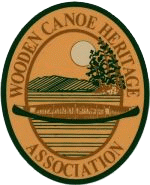|
Susquehanna Chapter |

|
|
WCHA Assembly 2010 Report | |
|
July 20, 2010 TO: WCHA Susquehanna Chapter FROM: Cindy and Craig Dunn WCHA Assembly We attended the WCHA assembly in Rindge, New Hampshire. Attendance was a record-setting 400-plus. For comparison, last year's attendance was 290. In addition to the crowd of people, there were dozens of wood-canvas canoes, lapstrake canoes, sailing canoes, guide boats and other wooden and historic craft, as well as paddles, baskets, carved items, tools, etc. Next year's assembly is set for July 20-24 at Paul Smiths College in the Adirondacks. We have been to that campus and can really recommend it! In addition to the forestry school, it is a culinary institute, so the food should be great. There is also a network of great trails up there, and great canoeing all around. Maybe we'll have a contingency from the Susquehanna Chapter who decide to go. Besides enjoying the presentations by renowned builders, historians and canoeists, we enjoyed the exhibits, demonstrations and camaraderie. Cindy made a cherry paddle as part of Caleb Davis’ instruction. Chapter Leaders Meeting Al Bratton convened a meeting of chapter leaders, which we attended. The chapter leaders reported on both their successes and challenges. It does seem like some common themes emerged, although some issues were unique, like the need for WCHA to establish exchange rate based membership dues for United Kingdom and Canada. Most chapters seem to offer a variety of programs, paddling trips and restoration projects. Attendance at these is fairly low. We mentioned that we "only" had about 15 members and only 9 showed up on a field trip and they all laughed, because that was considered high! We got a lot of comments that folks were very impressed how active the new Susquehanna Chapter was. We mentioned we were still working towards cohesion and several nodded, or chuckled as this is a common issue. Al suggested that structures, such as a committee or two should be set up to work on various aspects of WCHA chapter work, such as educational programs, restorations, exhibiting, paddling trips, etc. One personal observation we both had is that WCHA has a marked lack of formality in chapter structure compared to other non-profit organizations we have been involved with. A positive aspect of this is there is very little time spent on administrative and organizational details. The down side is that some chapters struggle for effectiveness without any prescribed or traditional structure or approach to solve them. Al Bratton's role is to help guide chapters with advice and suggestions. The WCHA Board voted to pay one-half the membership costs for WCHA Chapter heads to join the Antique Classic Boat Society (ACBS). WCHA will pay $22.50 of the $45 fee. The ACBS is thought to be an important partner and the hope is that chapter presidents would share the information with local chapter members. George – you get first dibs – are you interested? Additional ideas coming out of the chapters meeting included:
Other Chapters and activities One neat benefit of the chapters meeting was that we made contacts with the other nearby chapters, who invited us to attend their activities. They also want to be notified of our events, so we agreed to add their leaders to our email distribution. I have a few to give to Carole, and Jean or Al can provide others. Some specific invitations for our chapter are as follows:
Columbus Day Gifford Pinchot State Park four-chapter Assembly We had a brief planning meeting for the Columbus Day Weekend (October 9-11) four chapter assembly at Pinchot State park. They are looking for us to publicize it as Howard and others did last year. They have some programs in mind and Al and Jean will send a draft itinerary. Al Bratton and Jim Wilson will do a site visit soon, and we told him to loop us in so we can help coordinate with the park. Among the programs they already have in mind are a solo paddling clinic ($100/ per person). An indoor site is still needed for the Saturday evening lecture and slide program, which should then be publicized to the general public and through the park, if possible. Everyone should plan on bringing interesting wood and wood canvas boats. Someone will bring a war canoe (didn’t catch the name). I told them I will try to get a dug out and a birch bark canoe there, if possible. When we next meet, we should plan for the October Pinchot event, and lay out the second half of the year events and meetings. Is there interest in an August picnic, paddle? We could meet at a State Park Lake so we could bring the wood / canvas canoes. We will help organize a date / place if there is an interest. |